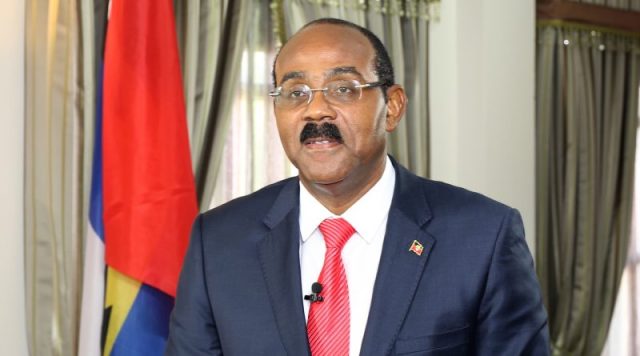By Vishani Ragobeer
As Caribbean economies seek to rebound from the near-crippling effects of the COVID-19 pandemic, Chairman of CARICOM and Prime Minister of Antigua and Barbuda, Gaston Browne said that a harmonised health protocol for intra-regional travel and a realignment of the region’s financial institutions could boost post-pandemic recovery.
The Prime Minister said this Monday, as he addressed the virtual opening ceremony of the 42nd Regular Meeting of the Heads of Government of the Caribbean Community (CARICOM).
During that address the Antiguan Prime Minister acknowledged the collective approach taken by CARICOM member states to manage the outbreak of the pandemic, noting that the Caribbean Public Health Agency (CARPHA) has been instrumental in the region’s fight against COVID-19.
He also acknowledged the work of the outgoing Chairman of CARICOM and Prime Minister of Trinidad and Tobago, Dr. Keith Rowley, who has been a fervent advocate for the equitable distribution of life-saving COVID-19 vaccines.
Still, the topic of the economic impact of the lockdown measures of the pandemic remains relevant due to the prolonged challenges, the Chairman said. And, he contended that the resumption of intra-regional travel, leading to the increased movement of people, would help to springboard economic recovery.
“To assist in this regard, we need to immediately establish common or harmonised regional health protocols for travel that are clear to the public and communicated widely,” he said, emphasising: “The discriminatory practice of banning travel from member states with elevated levels of COVID while accommodating guests from countries with higher risks should be discouraged.”
Within the context of the COVID-19 pandemic, CARICOM member states have assumed their own travel guidelines permitting or restricting travel. Some countries, like Guyana, have had a phased reopening of borders, but require that travellers present a negative COVID-19 test, taken a few days before travel.
Discussions have been ongoing about a COVID-19 vaccine ‘passport’ or ‘certificate’, which would indicate that travellers are immunised against SARS-CoV-2- the virus that causes COVID-19, but no decision has been taken.

Meanwhile, the CARICOM Chairman also called for the reduction of air travel taxes to allow for cheaper intra-regional travel. For many years, this reduction in taxes has been the subject of much discussion.
In June, Prime Minister Browne himself was expected to table a proposal at the Prime Ministerial Sub-Committee on the CARICOM Single Market and Economy (CSME) urging regional governments to an initiative to significantly reduce air transport taxes in a bid to encourage intra-regional travel as the threat from the pandemic declines.
He subsequently announced a 50 per cent reduction in taxes on airline tickets for travel within several countries of CARICOM, indicating also that the measure will last for six months in the first instance.
On Monday, the Prime Minister also reminded the leaders that the region’s dependence on tourism as an income earner should be examined. To this end, he emphasised that economic diversification, with a specific focus on agriculture, is much-needed.
REALIGNMENT OF FINANCIAL SECTOR
“Included in that conversation must be a more meaningful and revitalised goal for the Caribbean Development Bank (CDB) and Caribbean Development Fund (CDF),” the Prime Minister underscored.
He reasoned that these financial bodies, tasked with providing financial and technical assistance to countries in the community, are “overdue for realignment and retoolment” which would allow both institutions to scale up their operations and become facilitators to drive economic expansion in the region.
“We need to have the hard discussions necessary to empower both the CDB and the CDF, both now under fresh leadership, to provide that support,” the Prime Minister said.
In a stinging statement, the CARICOM Chairman also raised his concerns of Caribbean economies despite the adherence to the “myriad of ever-changing rules” advanced by the Organisation for Economic Co-operation and Development (OECD) and the Financial Action Task Force (FATF).
“We object to being targeted and placed on lists of so-called non-cooperative jurisdictions by countries that claim to be in economic partnership with us,” he said.
He also related his opposition to the recent United States’ proposal to require a minimum global tax for corporations starting at 15 per cent since this, he explained, could make small states uncompetitive. This is also of particular importance, he said, since such countries use taxation policies as legitimate instruments to better compensate for smaller market size, remote locations, lack of resources and an industrial disadvantage.
Beyond these concerns, the Prime Minister emphasised that CSME must be urgently implemented. Simply, the CSME is an arrangement among the CARICOM Member States for the creation of a single enlarged economic space through the removal of restrictions resulting in the free movement of goods, services, persons, capital and technology and it confers the right of CARICOM Nationals to establish a business in any participating CARICOM Member State.
“The full operationalisation of the CSME is required for the transformation of our economies and for a robust post–COVID economy, the Prime Minister said, emphasising that the region must not further delay the approval of the financial services agreement policy, incentive regimes and the regulation of a regional securities market.








